
by Beth Kassab | Oct 25, 2025 | Arts and Culture, City Commission, News
Blue Bamboo Founders Step Away After Recent Diagnosis
Chris and Melody Cortez led the remake of the old Winter Park Library into a music hub. Board Chairman Jeff Flowers will now take the lead as Chris Cortez faces brain cancer
Oct. 25, 2025
By Beth Kassab
The Blue Bamboo Center for the Arts opened this summer in the old Winter Park Library, a long-sought triumph for the nonprofit music venue in search of a new stage and for a city government looking for someone to remake the vacant building.
Now Chris Cortez, an accomplished musician, is stepping back from managing the group he started in 2016 with wife Melody, a visual artist, after he was diagnosed this month with glioblastoma, an aggressive brain cancer.
Cortez will retain “emeritus status” at the organization while board Chairman Jeff Flowers — chemist and arts philanthropist who operated environmental testing firm Flowers Chemical Laboratories and served two stints on the Maitland City Council — is taking the day-to-day leadership role.
“While Chris will no longer be involved in operations, his artistic vision and legacy continue to guide our mission and inspire our work,” Flowers said in a letter to the City Commission.
Flowers said he wants to assure the community that the Blue Bamboo “remains strong, active and sustainable.”
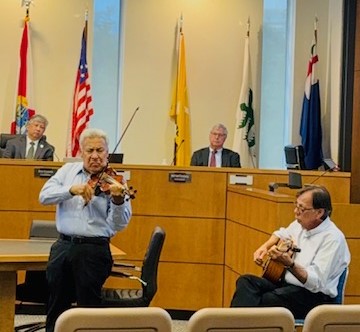
Blue Bamboo Founder Chris Cortez plays guitar with famed violinist Alvaro Gomez at a City Commission meeting in September. Above photo: Jeff Rupert, director of jazz studies at UCF and Blue Bamboo board member, plays at the Blue Bamboo in June with sons Preston and Django.
“Our board now meets monthly to review operations, finances and construction progress, and to provide guidance and accountability,” he said in the letter. “Directors have taken on leadership in operational, financial and technical areas ensuring that our transition is booth smooth and effective. We have also added staff to handle essential functions in sound, video production and hospitality services.”
Just before Cortez’s health challenge surfaced, the Blue Bamboo was facing another difficult transition when Central Florida Vocal Arts said it could not reach a lease agreement with Blue Bamboo and walked away from the project.
Theresa Smith-Levin, founder and executive director of CFVA and Opera del Sol, was a key partner in the effort to secure the support of the city along with a $1 million Tourist Development Tax grant from Orange County for construction.
Now the grant, which has not yet been paid out, is being reviewed by Orange County.
Smith-Levin’s group, which stages a variety of musicals and operas, was slated to occupy the second floor as teaching, rehearsal and office space and about $200,000 was designated from the grant for construction for those needs. Her group was also helping Blue Bamboo raise $500,000 in required matching funds and would have contributed half the rent on the building to the city, which is set to increase next year.
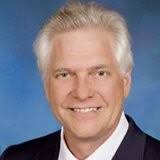
Jeff Flowers
Flowers said he has new matching funds identified and is working with another nonprofit to occupy space in the building.
Flowers also runs another nonprofit called Performing Arts Matters, which he and his wife founded two decades ago to fund groups such as the Orlando Contemporary Chamber Orchestra, which performed at Blue Bamboo over the summer.
The first floor of the building now features two performing spaces — a main stage with 182 seats and a smaller stage with a seating capacity of about 60.
“Looking ahead, we are expanding our programming to include classical performances,” Flowers’ letter said. “The Maitland Symphony Orchestra and Bravo Chamber Orchestra are planning their first concerts at the Blue Bamboo in 2026, following this past summer’s successful appearance by the Orlando Contemporary Chamber Orchestra — one of our best-attended events to date.”
One of the Blue Bamboo’s signature weekly events known as the Free Thursday Night Hang will continue, he said. Cortez started the event with a vision for professional jazz artists to share the stage with students or others emerging on the scene — part of his “stage for all” philosophy.
“With that mindset, the Boo became a go-to place for collaborative projects,” Cortez wrote on his website. “Big bands of all kinds, jam sessions, and what-if scenarios, all leading to a healthy environment for creativity. Audiences might attend a conservative, classical recital one day, and the next, a reimagining of Led Zeppelin as a latin salsa band. (That actually happened!)”
Flowers said the Blue Bamboo is planning a show Thursday night that will feature Cortez on the guitar, possibly his final time on the Blue Bamboo stage. The concert will be a tribute to Cortez and his contributions to the local music scene.
WinterParkVoiceEditor@gmail.com
To comment or read comments from others, click here →
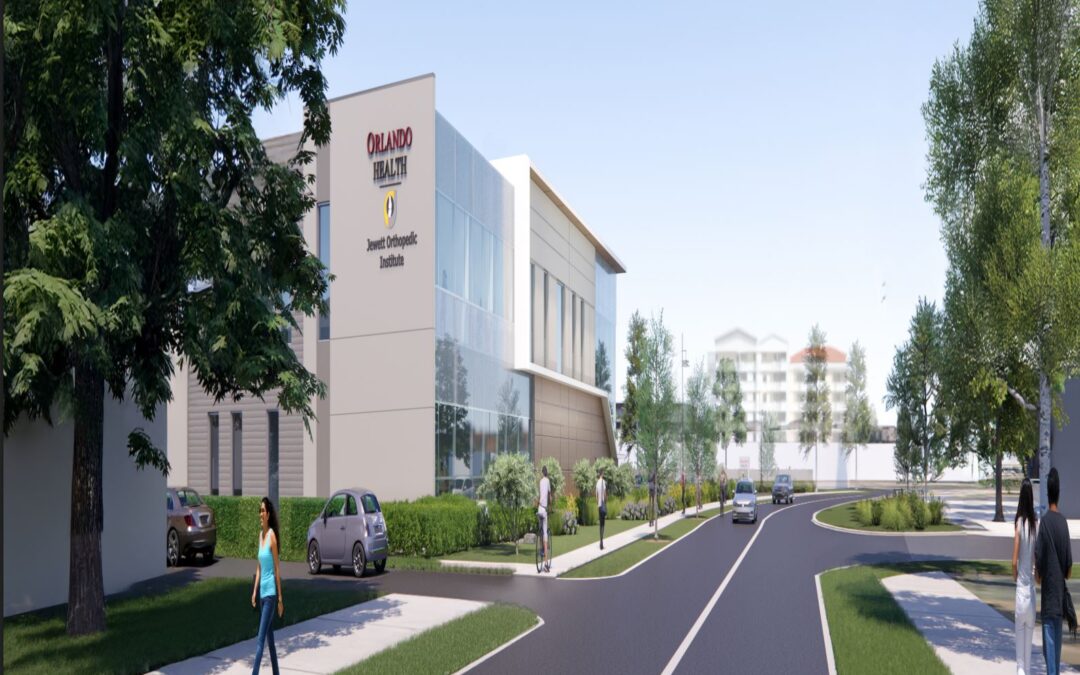
by Beth Kassab | Oct 23, 2025 | City Commission, News, Zoning and Development
New Racquet Club Building Approved With Even More Conditions
Also approved: New Jewett Ortho Building and a Raise for the City Manager
Oct. 23, 2025
By Beth Kassab
The Winter Park Racquet Club won approval for a new building in the residential enclave off Lake Maitland known as the Vias after a contentious debate with neighbors that included a final-hour meeting before Wednesday’s vote that led to additional conditions imposed on the 72-year-old private club.
Commissioners voted 4-1 to allow the demolition of a two-story house on Via Tuscany and construction of a new single-story fitness center, tennis shop and offices with 12 new conditions on top of the nine rules recommended by the Planning & Zoning Board. Commissioner Warren Lindsey, who said he was a former member of the club, was the only dissenting vote.
The sentiment of the people who live in the neighborhood was mixed with several residents who live closest to the club still urging commissioners to vote against the project.
Dr. Scott Greenberg, a recently retired plastic surgeon who lives directly across the street from the club, said he was part of the meeting that resulted in the new conditions.
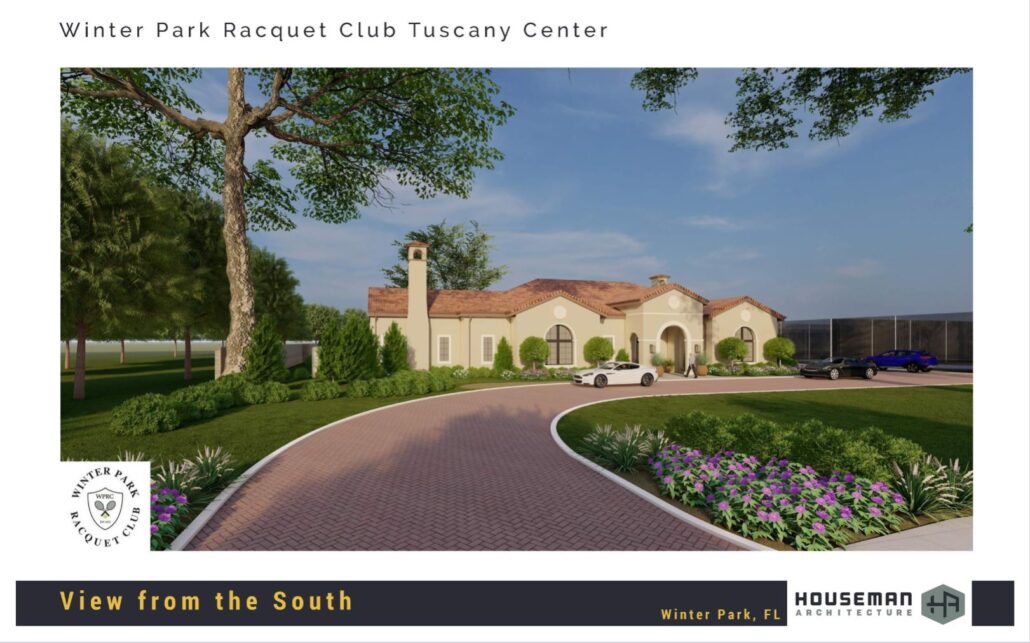
“We felt we had to agree to them because we didn’t have a choice,” said Greenberg, who asked commissioners to cast a “no” vote and said there was a “culture of mistrust” because he was led to believe the home at 2011 Via Tuscany would be left as it when the club purchased it in 2015.
Marci Greenberg told the Voice that the club was hardly noticeable when she and her husband moved to their home, but has since grown significantly with more traffic, noise and lights from the tennis and pickleball courts.
Hillary Turner, who lives nearby and whose mother lives directly next to the club, echoed that point in front of the commission on Wednesday.
“When we moved to this property in 1980 most of the hosuess didn’t have pools,” she said. “They didn’t need them because everyone swam at the racquet club. The racquet club, at that time, was a neighborhood club. It has now transformed into a club within a neighborhood.”
She said the club’s size over the years has more than doubled to 500 members and many don’t live in the neighborhood.
Clay Coward is a member of the club who lives less than a mile away and said he supported the club’s plans and noted the number of times smaller homes in the area have been torn down and replaced by large “mansions.”
He showed the commission several photos of homes along Via Tuscany, including one he called “Hotel California” because he said it’s reminiscent of the Eagles album cover. The house is about 9,000 square feet, has eight bathrooms and what appears to be a six-car garage — not unusual attributes for the lakefront neighborhood of multi-million dollar homes.
Coward suggested the club’s redo of the house at 2011 Via Tuscany into a 6,300-square-foot mediterranean style building would fit right in.
Rob Carter, one of the club officers who has led the project, said he has tried to work and collaborate with the neighbors.
“This has been a long road,” he said, noting that the club has “readily agreed” to multiple conditions.
He said the current house could not be renovated because its age, old windows, low ceilings and a pool in the backyard the club would not want to use made it cost prohibitive.
The new building he said will provide not only a new small gym and locker rooms for members but, for the first time, a separate area for staff to eat meals and staff restrooms.
“Right now there’s no break room or segregated bathrooms,” he said.
The club agreed to following new conditions on top of the nine already set by Planning & Zoning.
- Keep or replace the existing podocarpus hedge at the front of the property and added additional hedges to fill in the property line.
- Cars cannot be parked in the circular driveway off Via Tuscany except for special events, which will be limited to five cars.
- No parking can occur on the lot before construction begins.
- The club can not host large events for non-members unless it’s member-sponsored.
- The size of events must be capped to eliminate the need for on-street parking.
- Must plant podocarpus hedge on the northern property line adjacent to the home at 2175 Via Tuscany.
- Must add glare shields to the lights on the pickleball courts.
- Must turn off lights on tennis and pickleball courts when not in use.
- Must cap membership at the current 500 members.
- Eliminate existing ads for event space online or in print publications.
- Must allow the podocarpus hedge in front of the pickleball courts to grow to the height of the fence surrounding the courts.
- Compliance with the conditions will be monitored with the typical code compliance procedures.
During the commission meeting the additional conditions were added: there must be blinds or curtains on the new gym window facing Via Tuscany, the club must establish a neighborhood relations committee and the club can not add signs to the front of the building (which it wasn’t proposing to do).
New Jewett Building for Orlando Health
Orlando Health won approval on Wednesday to build a new Jewett Orthopedic Institute on Gay Road and Trovillion Avenue not far off U.S. 17-92 across from Winter Park Village.
The 27,000-square-foot, two-story building will combine five lots that are mostly vacant today and will replace the longtime Jewett offices 1285 Orange Avenue.
Jewett became part of the Orlando Health hospital system in 2020 and also has a large office in downtown Orlando near the hospital’s main campus.
In 2019, the commission approved an office development for the property, but the development never happened. That approved plan included a 6-foot masonry perimeter wall and lush landscape to buffer the development next to the Chateaux du lac and
Killarney Bay condominiums.
The new conditions call for a perimeter fence and a perimeter hedge along those property lines.
Raise for City Manager
The board also approved a 3% merit raise for City Manager Randy Knight and thanked him for his longtime dedication to the job.
Knight, who has worked for the city for more than 30 years and as city manager for 18 years, earns $274,393. He plans to retire in 2027.
WinterParkVoiceEditor@gmail.com
To comment or read comments from others, click here →
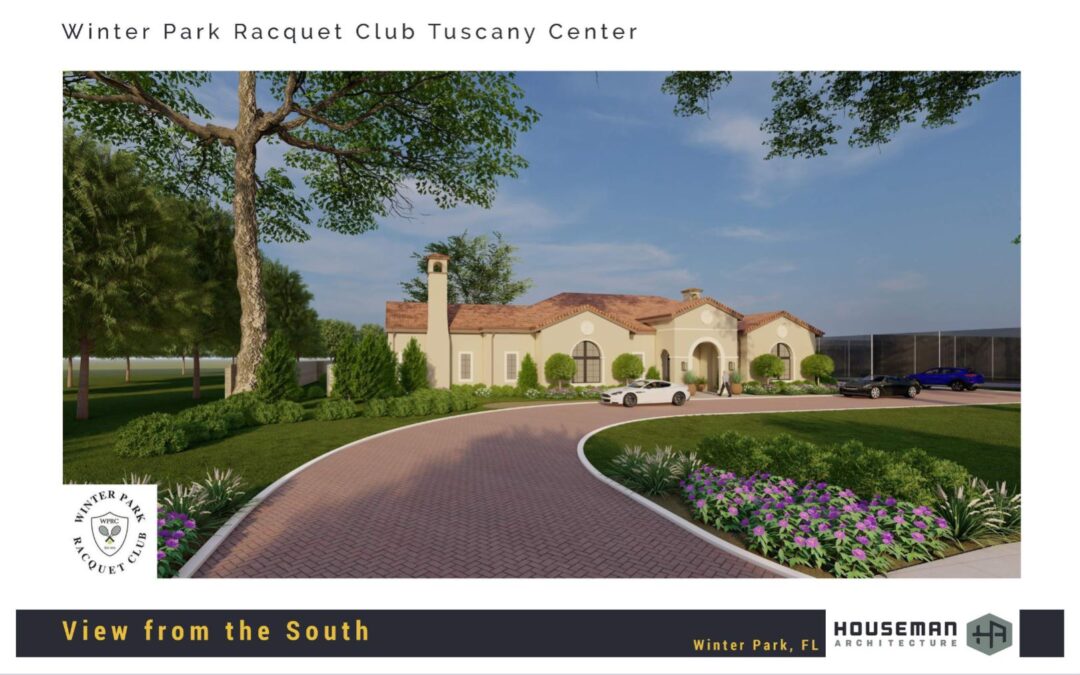
by Beth Kassab | Oct 20, 2025 | City Commission, News, Zoning and Development
Commission to Consider Racquet Club Expansion This Week
Also up for consideration is the city manager’s evaluation and salary
Oct. 20, 2025
By Beth Kassab
A controversial expansion planned by the exclusive Winter Park Racquet Club will look to the City Commission this week for final approval.
Some residents in the neighborhood known as “the Vias,” a posh enclave between the shores of Lake Maitland and Temple Drive, oppose the changes at the club, which they say already lights up their quiet street like a “Walmart” or “McDonald’s” at night with pickleball courts, tennis courts and events.
The meeting on Wednesday is likely to feature debate on the plans, with call for the white-columned two-story home at 2111 Via Tuscany to be torn down and replaced with a larger one-story building to house a new fitness center, locker rooms, tennis shop and offices for the club. The proposal was approved earlier this month by the Planning & Zoning Board in a 5-1 vote.
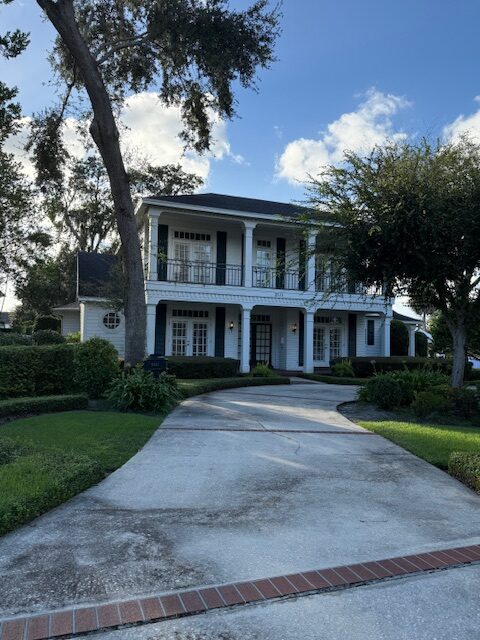
This home on Via Tuscany will be demolished if the Racquet Club’s plans are approved to make way for the proposed building pictured above.
Conditions of the approval by P&Z include the following, according to the staff report:
- The driveway on Via Tuscany will be an entrance-only access point.
- WPRC can not increase its membership.
- Hours of operation of the new building will be limited to 7 a.m. to 8 p.m. daily,
including deliveries.
- No new lighting will be provided in the grass parking lot behind the new building.
- All non-required lights for safety purposes be shut off by 10:00 p.m. daily.
- As part of the tree removal permit for the 25 and 27-inch oaks, double the required
compensation shall be required, at four six-inch canopy trees, subject to Urban Forestry
approval and be planted at least 15-feet from the southern property line
wall or fence.
- Narrow the proposed driveway to 12 feet at the entrance on Via Tuscany and
the exit onto Tom Gurney Drive. The width of the middle portion of the driveway may be a maximum of 14 feet.
- Conduct a comprehensive photometric analysis of the entire WPRC campus to confirm that all lighting is fully shielded at the property boundaries and implement any necessary measures to eliminate light spillover onto adjacent properties.
- Shut off all pickleball lights by 8 p.m., instead of the current cutoff of 9 p.m., daily.
The City Commission has the ability to accept, reject or change any of the conditions when it meets on Wednesday.
Raise for City Manager?
The Commission on Wednesday will also take up its annual evaluation of City Manager Randy Knight, who oversees the day-to-day operations of the city and its 500 employees.
Knight, who has worked for the city for more than 30 years and as city manager for 18 years, earns $274,393 and is eligible for up to a 3% merit increase.
Commissioners gave him an average rating of 3.8 on 4-point scale of leadership and performance metrics, according to city documents.
On a list of other cities with a city manager form of government provided to commissioners, Knight was the highest earner in Central Florida with the exception of the Villages, which isn’t actually a city but a collection of unincorporated retirement communities with more than 80,000 residents. It pays its district manager $324,000, according to the document.
The city of Winter Park has about 30,000 residents.
Several South Florida cities on the list such as Miami Beach (pays $298,000 with 83,000 people), Naples (pays $325,000 with 20,000 people), Cape Coral (pays $330,000 with 223,000 people) and Ft. Lauderdale (pays $350,000 with 190,000 people) also boasted higher salaries.
Knight has said he plans to retire in early 2027.
WinterParkVoiceEditor@gmail.com
To comment or read comments from others, click here →
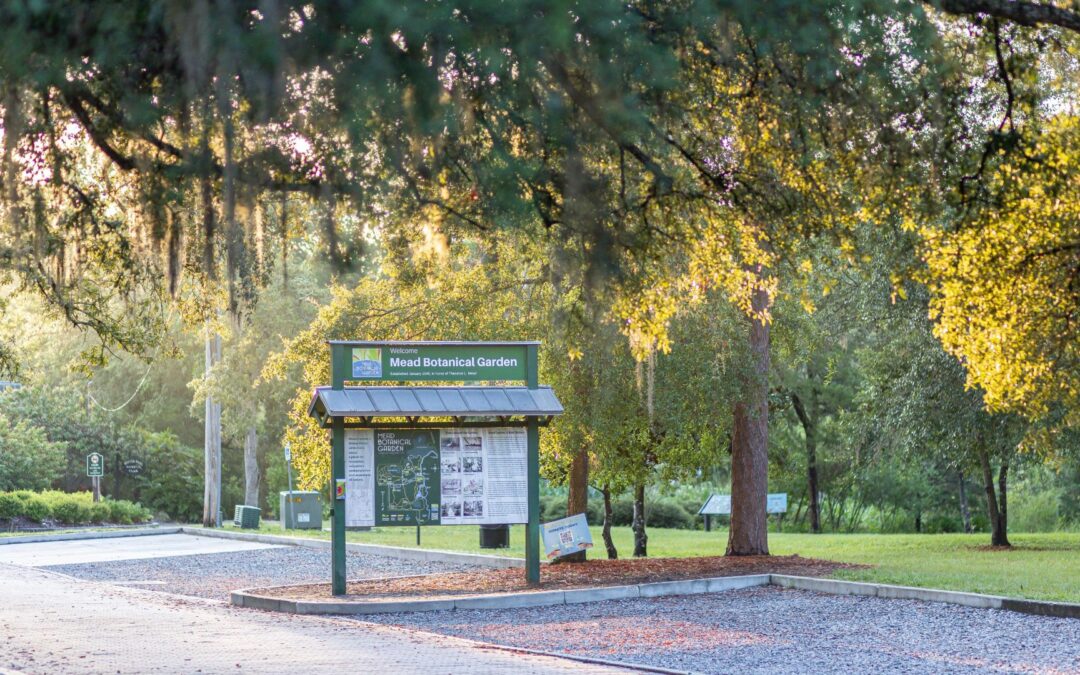
by Beth Kassab | Oct 20, 2025 | Arts and Culture, City Commission, Library, News
How Should City Commission Give Dollars to Nonprofits?
The City Commission will consider this week a new system for awarding nonprofit grants and also discuss if the Parks & Rec department should sell ads and sponsorships
Oct. 20, 2025
By Beth Kassab
Each year the city of Winter Park, like many local governments, doles out a portion of public dollars to help nonprofits like Mead Botanical Gardens, Winter Park Day Nursery, the Winter Park Library and Blue Bamboo Center for the Arts.
But this year, amid economic and budget uncertainty, the City Commission held back $140,000 — and didn’t renew one-time grants to the Winter Park Institute and Men of Integrity — with the intent of formalizing the grant process and determining who is eligible.
This week commissioners are slated to finally have that discussion on Thursday in a workshop.
The conversation comes about amid major cuts to arts and nonprofit funding on the state level and efforts by Gov. Ron DeSantis’ administration to showcase what it deems as “wasteful” local government spending through its “DOGE Team.” The administration is targeting cities and counties with audits and press conferences that it claims are highlighting “waste, fraud and abuse” such as a tree inventory program at the city of Orlando or programs for LGBT youth services in Orange County.
City staff are proposing the creation of a temporary committee each year that would evaluate grant requests and make recommendations for 10 recipients of $10,000 each for “relevant, and meaningful, arts, science, history, social services, and educational experiences of value to the local community.” The committee members would consist of people who already serve on other city advisory boards such as Parks & Recreation and Historic Preservation.
To be eligible, nonprofits must serve Winter Park and can not support a political cause or candidate, can not be connected to a for-profit business and can not already be receiving more than $10,000 in funding from the city, according to the proposal.
The money for the grants comes from .25% of the gross revenue from each of the city’s three major funds — the general fund, electric and water and wastewater.
That generates about $442,000. Some organizations already receive a yearly allotment from that pool. The new policy would address new requests totaling about $100,000.
Those that receive yearly funding, including the Winter Park Library, are:
- Mead Botanical Gardens: $102,000
- Winter Park Historical Association: $97,000
- Winter Park Day Nursery: $42,500
- United Arts: $20,000
- Blue Bamboo: $12,500
- Polasek Museum: $28,000
- Winter Park Library: $2.1 million
The staff report also noted that state government has targeted the ability of Community Redevelopment Agencies to support nonprofits, though so far, there have been no changes to the law. In the future, however, CRAs may be prohibited from making such grants.
Winter Park’s CRA makes the following contributions, according to the 2026 budget:
- Enzian Theater: $10,000
- Heritage Center: $50,000
- Welbourne Day Nursery: $43,000
- Winter Park Playhouse: $49,300
- Depugh Nursing Home: $24,000 (This group recently announced it’s closing)
Ads at Parks?
Commissioners will also discuss on Thursday a plan that city staff estimates could generate $100,000 a year by selling ads and sponsorships at city parks or events.
The effort would mostly focus on the city’s two golf courses, the tennis center and other parks with high foot traffic. Central Park, the highest-profile public green space along Park Avenue, would be off limits to advertisers, according to the proposal.
Some examples of places where the city could sell ads to raise extra funds: interior fencing at tennis courts, golf course scorecards, banners in gymnasiums or fields or t-shirts for adult athletic leagues or summer camps. Sponsorships could be sold for city events such as the Fourth of July celebration, Weekend of the Arts and Dinner on the Avenue or programs such as Movies in the Park or the rotating art installations set to begin next year in Seven Oaks Park.
“Today, financial and in-kind support is even more critical as the investment needed to sustain and improve the parks, facilities, and programs continues to rise,” reads a memo about the proposal. “Like other park and recreation departments across the nation, the parks and recreation department is pursuing more sophisticated business partnerships with the for-profit and non-profit sectors, in the form of events, programs, projects, and site sponsorship along with limited advertising.”
WinterParkVoiceEditor@gmail.com
To comment or read comments from others, click here →
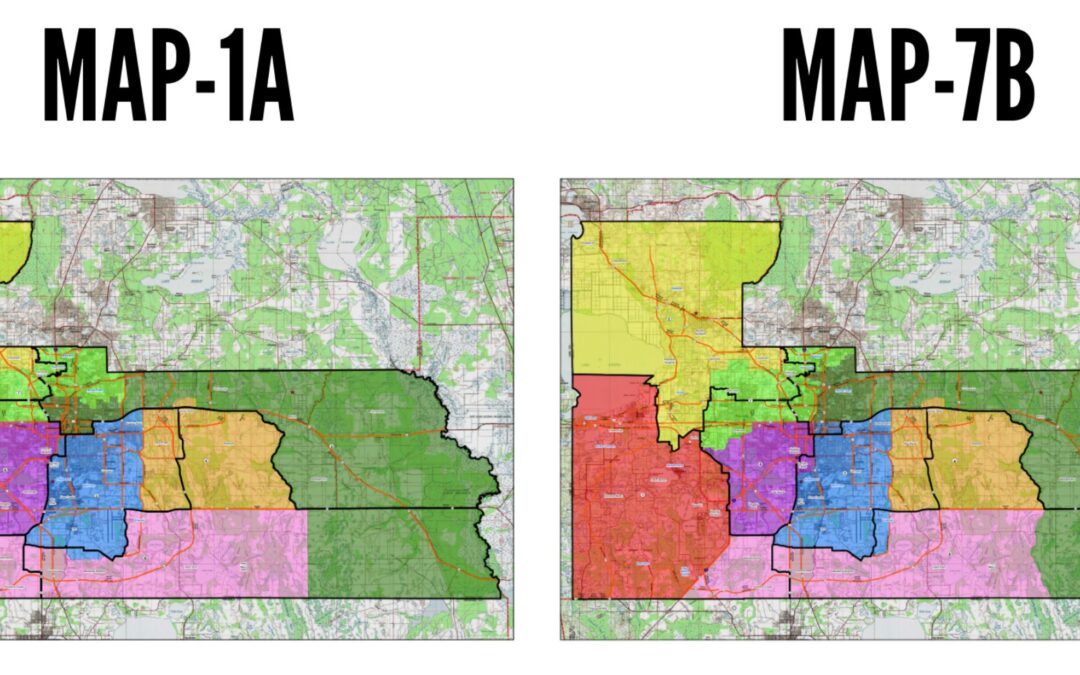
by Beth Kassab | Oct 15, 2025 | City Commission, County News, News
Winter Park Loses County Redistricting Fight
The city will remain in District 5 with the eastern rural stretch of Orange County represented by Commissioner Kelly Martinez Semrad
Oct. 15, 2025
By Gabrielle Russon
Winter Park lost its fight to move into one of the two newly-created county commission districts in a battle that largely pitted the needs of residents in the unincorporated and historically neglected area of Pine Hills against the more affluent city.
Winter Park Mayor Sheila DeCiccio and all four city commissioners attended the hours-long debate on Tuesday and lobbied the Orange County board, but it wasn’t enough to persuade the county leaders.
The County Commission voted 5-2 to adopt a new district map known as “Map 7B”, which leaves Winter Park, a city of about 30,000 residents, in District 5 with the rural eastern section of the county that runs all the way to the Brevard County line. The map breaks off Winter Park’s closest neighbor Maitland (population: 20,000) into the new District 7 with Eatonville (which also borders Winter Park with about 2,300 residents and is known as the nation’s oldest incorporated town founded by formerly enslaved people).

Kelly Martinez Semrad
Commissioners Christine Moore and Mayra Uribe cast the dissenting votes with Mayor Jerry Demings and commissioners Kelly Martinez Semrad, Mike Scott, Nicole Wilson and Maribel Gomez Cordero voting in favor.
DeCiccio, a persistent advocate for Winter Park during months of redistricting meetings, argued the city has little in common with the rural areas. She and the other Winter Park officials wanted to be redistricted into District 7 along with their urban neighbors who often work together on public projects.
But an equally loud group of residents pushed to keep the status quo and argued the more affluent Winter Park would dominate the bigger, predominately Black and Hispanic community of unincorporated Pine Hills, which will also be part of District 7.
“Combining these communities under Map-1A would dilute the voting strength of Pine Hills residents and undermine their ability to elect candidates to understand and advocate for their needs,” said Delmarie Alicea, who lives in unincorporated Orange County and is a voting rights attorney for LatinoJustice PRLDEF.
Most people who emailed Martinez Semrad, who represents District 5, supported keeping Winter Park in her district, according to a Winter Park Voice public records request.
The commissioner received more than 85 signed emails with messages that had identical templates and said they were written “on behalf of Orange County’s young people.”
“The differences between Map 1 and Map 7 largely center around the preferences of affluent communities like Winter Park and Maitland versus the equitable representation of all communities across Orange County,” their emails said.
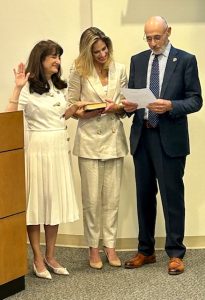
Mayor Sheila DeCiccio is sworn in on April 10, 2024 alongside her husband and daughter.
The redistricting debate comes after voters approved a referendum last year to increase the number of districts from six to eight, opening up two new elected seats on the board that pay more than $120,000 a year. The Orange County mayor serves as the ninth seat and is elected countywide.
More than 70 people signed up to speak at Tuesday’s meeting, which ran more than two hours, before the final vote.
Conceding she was in the “hot seat” was Martinez Semrad, who ultimately voted in support of keeping Winter Park in her district instead of moving it to District 7.
Martinez Semrad, who lives in east Orange County, won in 2024 with the support of Winter Park voters. As an underdog, she beat the better-funded former Winter Park Mayor Steve Leary.
Even Winter Park City Commissioner Kris Cruzada acknowledged Tuesday she was in a tough position to decide if Winter Park should get cut from her district.
“Winter Park and Maitland want Map-1A. East Orange County wants Map-7B. Our district commissioner has to choose between supporting the 48,000 in Maitland and Winter Park or supporting the greater number of east Orange County where she lives,” Cruzada said during public comment. “I don’t envy the decision.”
Earlier this summer, Martinez Semrad said she supported Winter Park remaining in her district. After receiving an overwhelming response from the public, she later backtracked and said last month she was undecided.
She outlined her decision-making out loud before the vote Tuesday.
“There’s no map regardless of what District 5 picks that satisfies every community in District 5,” she said. “So being in a hot seat, I’m going to depend on what I think is one of my strengths and that is to let the data tell the story.”
Looking back at the 37-year history, the District 5 Commissioner has been represented by someone from Maitland or Winter Park 76% of the time. The only exceptions were Commissioner Emily Bonilla and then herself, Martinez Semrad said.
So she argued Winter Park has received fair representation on the county board.
Martinez Semrad said keeping Winter Park in District 5 made sense because the population is geographically balanced to where most people live centrally and the Econlockhatchee River serves as a natural boundary. District 5 also maintains an education corridor since the University of Central Florida, Rollins College and Full Sail University were all grouped together.
She also took issue with Winter Park’s claims it has nothing in common with the rural east. She argued the homeownership rates, property values and people’s reliance on cars for transportation “are similarities there,” she said.
Her desire to keep Winter Park in District 5 was also framed around making sure districts balance out the unincorporated areas since they are more dependent on the county for fire, police and other infrastructure needs than the cities are.
Martinez Semrad added, “It makes me a little sad that tonight we talk about who we want to be with and who we don’t want to be with because, after all, we are all Orange County citizens.”
Robert Whatley, president of the Christmas Civic Association, wrote his group supported keeping the status quo since it “gave us the best chance of maintaining our rural lifestyle going into the future.”
But Winter Park resident Phil Erwin wrote District 5 just didn’t make sense and Winter Park needed new representation.
“As a Winter Park resident, I have absolutely no knowledge of most of the area that District 5 encompasses,” Erwin wrote. “I rarely travel east of 436 and only drive through the eastern part of the district on my way to the coast. It is beyond my wildest imagination why the community I live in is bundled with such a vast territory of complete unfamiliarity.”
WinterParkVoiceEditor@gmail.com
To comment or read comments from others, click here →
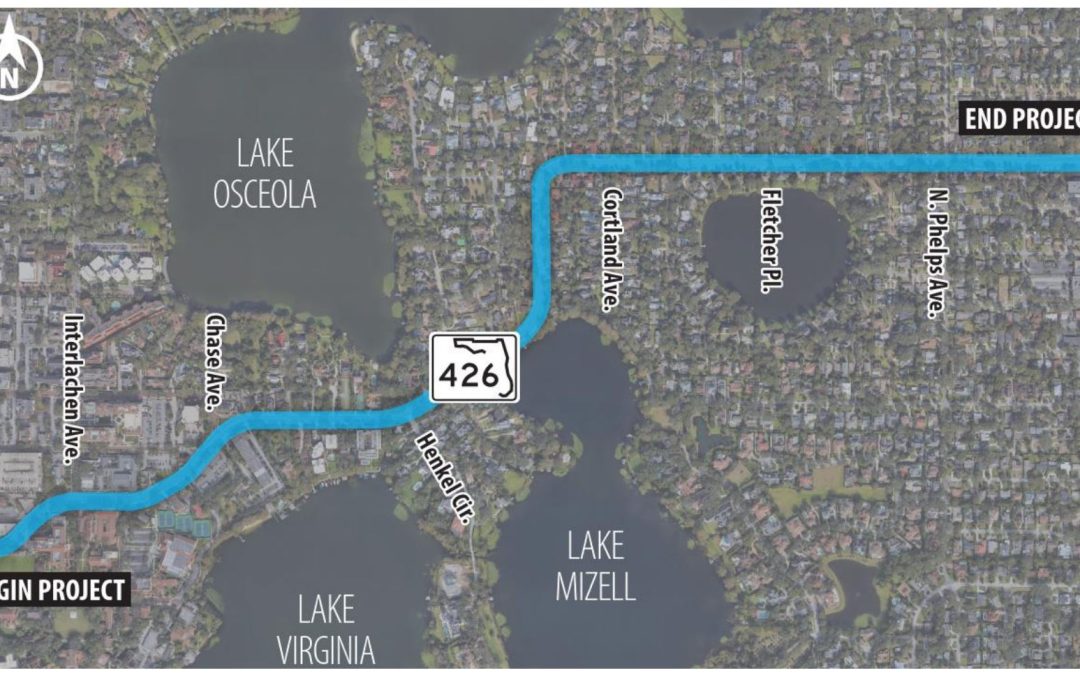
by Beth Kassab | Oct 14, 2025 | City Commission, News
City's Share of 'Fix 426' will be $392,000
Winter Park will spend the money to slow traffic and improve pedestrian safety along the busy stretch of the state road that connects Winter Park to Oviedo
Oct. 14, 2025
By Beth Kassab
Winter Park taxpayers will spend about $392,000 for the city’s share of long-awaited pedestrian and traffic improvements to the 1.7-mile curvy stretch of S.R. 426 from Park Avenue to Lakemont Avenue that winds between Lake Osceola on the north and lakes Virginia, Mizell and Sylvan on the south.
The project started more than three years ago with pleas from residents to “Fix 426,” a main connector from Winter Park to Oviedo. State data shows the busy stretch of S.R. 426 averages six car crashes per month and more than 4,000 speed violations daily.
The City Commission last week unanimously approved spending $391,675 for its share of a larger road resurfacing project led by the Florida Department of Transportation, which is responsible for maintaining the state road.
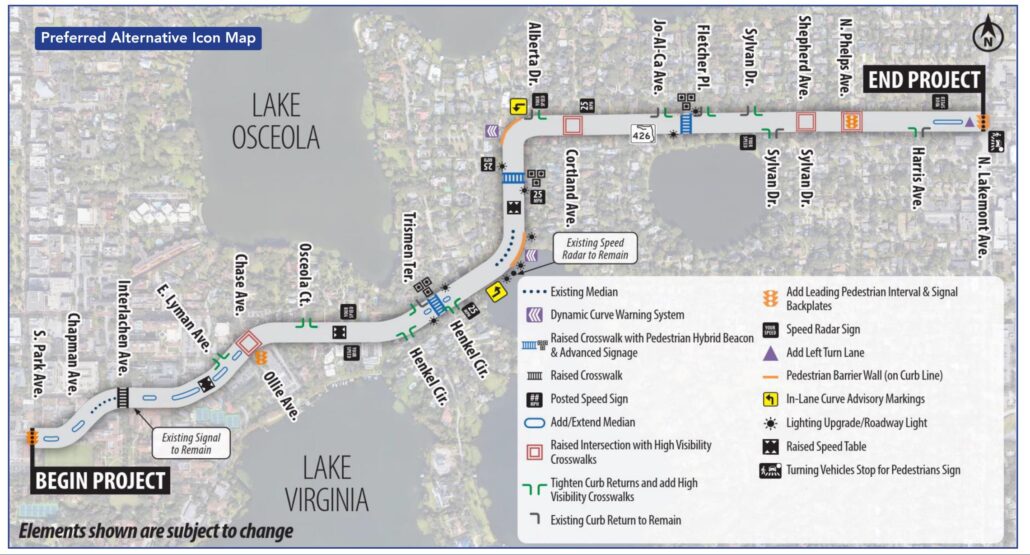
Winter Park’s share is now far lower than an earlier estimate of nearly $2 million before the project was scaled down considerably and more negotiations took place, said Charles Ramdatt, Winter Park’s public works and transportation director.
“It’s a better deal than we had before,” he told commissioners.
The work will include adding raised crosswalks to slow traffic, upgraded traffic signals, pedestrian hybrid beacons or flashing signals that stop traffic for people to cross on foot and reconstruction of a gravity wall between Fletcher Place and Sylvan Drive.
The wall, which keeps the soil from a raised lot from spilling into the sidewalk and roadway, was the subject of lengthy discussions between the city, state and property owner as no one was clear on who originally constructed the wall.
The wall, which sits on FDOT’s right-of-way, was crumbling and FDOT constructed a temporary replacement. Ultimately, FDOT conceded it may have built the original and agreed to maintain the new wall going forward, Ramdatt said.
“I think this is going to be great,” said Mayor Sheila DeCiccio, though she conceded not everyone will be happy about the “speed bumps” or raised crosswalks. “It’s going to be great for traffic and pedestrians.”
No one from the public spoke on the matter before the vote, though there were multiple community meetings on the project in recent years.
The city made an initial financial commitment of $1.8 million in 2023, but the project has since been scaled back.
Due to maintenance challenges and complications, brick intersections, landscaped medians and bus stop pavement markings are no longer part of the plans.
An FDOT spokeswoman did not immediately respond to a request for the total cost of the project or when construction is slated to begin and end.
WinterParkVoiceEditor@gmail.com
To comment or read comments from others, click here →













Recent Comments